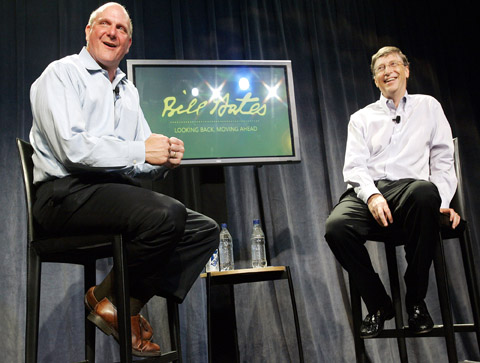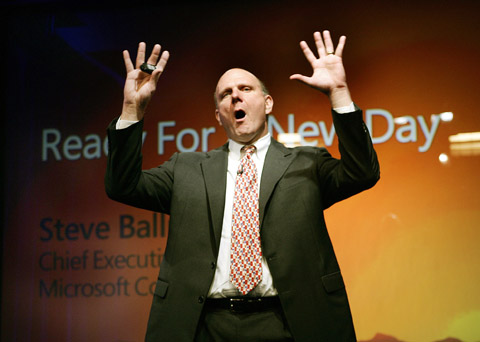Despite his role as chief executive at one of the most influential companies in the world, Steve Ballmer is relatively unknown outside the technology industry — having always been eclipsed in the public eye by one of his oldest friends, Bill Gates. But when Gates stepped out of his Microsoft office for the last time on Friday, leaving the company in the hands of his former college buddy, the 52-year-old Ballmer stepped out of his shadow.
Given his bombastic style and imposing physique — he stands 1.83m tall and carries the broad, bone-breaking stature of a retired American football player — it is unlikely that Ballmer will find trouble making his mark.
He is well known for his boundless excitement — which often explodes dramatically — and retains an unquenchable enthusiasm for the software company he joined 28 years ago.

PHOTO: BLOOMBERG
The clearest insight into the mind of the 63rd richest man in the world is probably a single, minute-long piece of video that shows Ballmer on stage at an internal Microsoft event, skipping around like a dervish. He screams, yelps and caterwauls, before stopping to shout “I love this company!” His bizarre dancing — more pumped-up sports coach than corporate executive — is now as much part of his legend as his notoriously quick temper.
Microsoft employees — who would talk only on condition of anonymity — describe how Ballmer can become excessively angry in meetings, the most famous example being when one member of staff, Mark Lucovsky, told his boss he was quitting to join Google.
In a sworn affidavit to a US court, Lucovsky described how Ballmer responded by throwing a chair across the room and shouting: “Fucking Eric Schmidt [chief executive of Google] is a fucking pussy. I’m going to fucking bury that guy. I’ve done it before, and I will do it again: I’m going to fucking kill Google.”

PHOTO: AFP
He might be quick to anger, but those who know him describe Ballmer as quick, mathematically gifted and intense. His background is all-American: born in the affluent suburbs of Detroit, his father was a manager at Ford who sent his son to Harvard.
It was there that he became friends with Gates; the pair lived down the hall from each other and shared an interest in mathematics. While Gates dropped out to found Microsoft in 1975 — famously stating that the college had nothing more to teach him — Ballmer went on to graduate and then joined Procter & Gamble as a product manager.
Shortly after returning to college to study business at Stanford University, however, Ballmer was recruited by his old friend. After joining Microsoft in 1980 as the company’s 24th employee he worked on assignments around the US and Europe.
Such dedication was rewarded, and Ballmer quickly became Gates’s go-to guy, making up for his lack of technical expertise with passion and commitment to the cause. Over the next 20 years he commanded various company divisions, before rising to president in 1998 and then, in 2000, CEO.
“Loyalty is Ballmer’s number one strength,” says Fredric Alan Maxwell, who wrote the unauthorized 2002 biography Bad Boy Ballmer: The Man Who Rules Microsoft. “If Ballmer were your friend, he’d be the best friend that you ever had. His loyalty is one of the reasons he still drives Ford cars — his father worked there.”
Those who have worked with him describe his management style as “macho” and “intimidating,” and for good reason: he tore his vocal cords at one meeting after shouting too much.
Lyndsay Williams, a former engineer at Microsoft’s Cambridge Research Center in the UK who has met Ballmer several times, described their first meeting.
“He shook my hand and it felt like he had crushed every bone,” she said. “I found it a bit overpowering — after all, it’s not a power struggle.”
Whether or not he is the archetypal alpha male, such examples of his infamous bullish machismo seem to have characterized Ballmer’s command of the company since he became chief executive. Critics focus on Microsoft’s history of anti-competitive practices, while insiders remain concerned about its stalling share price and lack of vision. The recent attempt to buy Yahoo, which carried a sense of both desperation and intimidation, has led many to wonder publicly whether Ballmer is the right man for the job.
The fear, say those familiar with the company, is that after a decade-long transition of power from Gates, Ballmer is in danger of being stuck in the past. And even though younger rivals such as Google are outflanking the Seattle software giant, Ballmer cannot stop himself trying to stay top dog.
“Ballmer simply doesn’t like to lose. At all,” said Maxwell. “He’s a competition addict. Or, as one of his Harvard classmates told me, when his competition switch was turned on, it then broke.”

Aug. 4 to Aug. 10 When Coca-Cola finally pushed its way into Taiwan’s market in 1968, it allegedly vowed to wipe out its major domestic rival Hey Song within five years. But Hey Song, which began as a manual operation in a family cow shed in 1925, had proven its resilience, surviving numerous setbacks — including the loss of autonomy and nearly all its assets due to the Japanese colonial government’s wartime economic policy. By the 1960s, Hey Song had risen to the top of Taiwan’s beverage industry. This success was driven not only by president Chang Wen-chi’s

Last week, on the heels of the recall election that turned out so badly for Taiwan, came the news that US President Donald Trump had blocked the transit of President William Lai (賴清德) through the US on his way to Latin America. A few days later the international media reported that in June a scheduled visit by Minister of National Defense Wellington Koo (顧立雄) for high level meetings was canceled by the US after China’s President Xi Jinping (習近平) asked Trump to curb US engagement with Taiwan during a June phone call. The cancellation of Lai’s transit was a gaudy

From Godzilla’s fiery atomic breath to post-apocalyptic anime and harrowing depictions of radiation sickness, the influence of the nuclear bombings of Hiroshima and Nagasaki runs deep in Japanese popular culture. In the 80 years since the World War II attacks, stories of destruction and mutation have been fused with fears around natural disasters and, more recently, the Fukushima crisis. Classic manga and anime series Astro Boy is called “Mighty Atom” in Japanese, while city-leveling explosions loom large in other titles such as Akira, Neon Genesis Evangelion and Attack on Titan. “Living through tremendous pain” and overcoming trauma is a recurrent theme in Japan’s

As last month dawned, the Democratic Progressive Party (DPP) was in a good position. The recall campaigns had strong momentum, polling showed many Chinese Nationalist Party (KMT) lawmakers at risk of recall and even the KMT was bracing for losing seats while facing a tsunami of voter fraud investigations. Polling pointed to some of the recalls being a lock for victory. Though in most districts the majority was against recalling their lawmaker, among voters “definitely” planning to vote, there were double-digit margins in favor of recall in at least five districts, with three districts near or above 20 percent in